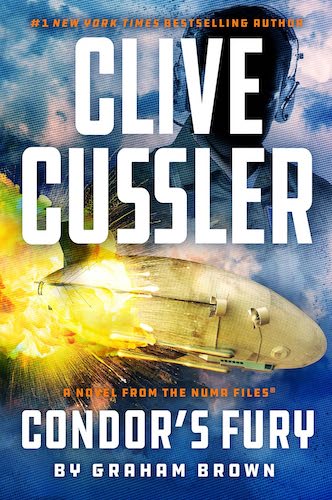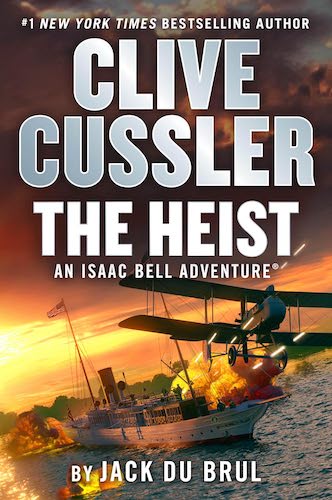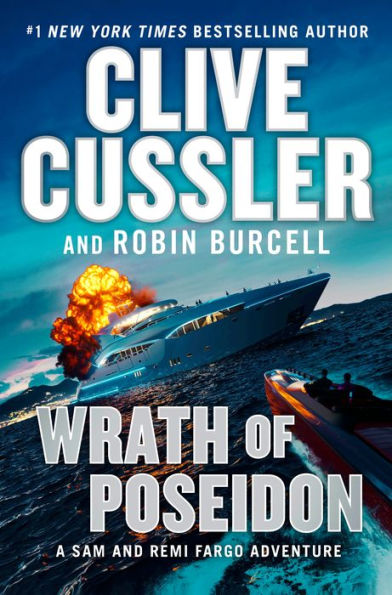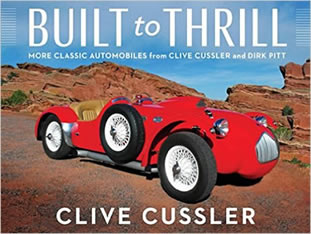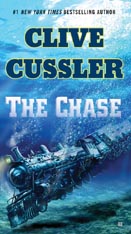
|
The Chaseby Clive CusslerAn Isaac Bell Adventure Original publication date: 2007 by Putnam paperback | 9780425224427 |
April 1950: The rusting hulk of a steam locomotive rises from the deep waters of a Montana lake. Inside is all that remains of three men who died forty-four years before. But it is not the engine or its grisly contents that interest the people watching nearby. It is what is about to come next...
1906: For two years, the western states of America have been suffering an extraordinary crime spree: a string of bank robberies by a single man who cold-bloodedly murders any and all witnesses and then vanishes without a trace. Fed up by the depredations of the "Butcher Bandit," the U.S. government brings in the best man they can find-a tall, lean, no-nonsense detective named Isaac Bell, who has caught thieves and killers coast to coast.
But Bell has never had a challenge like this one. From Arizona to Colorado to the streets of San Francisco during its calamitous earthquake and fire, he pursues what is quickly becoming clear to him is the sharpest criminal mind he has ever encountered, and the woman who seems to hold the key to the bandit's identity. Using science, deduction, and intuition, Bell repeatedly draws near only to grasp at thin air, but at least he knows his pursuit is having an effect. Because his quarry is getting angry now, and has turned the chase back on him. The hunter has become the hunted. And soon it will take all of Isaac Bell's skills not merely to prevail..but to survive.
Excerpt
APRIL 15, 1950
FLATHEAD LAKE, MONTANA
It rose from the depths like an evil monster in a Mesozoic sea. A coat of green slime covered the cab and boiler while gray-brown silt from the lake bottom slid and fell off the eighty-one-inch drive wheels and splashed into the cold waters of the lake. Ascending slowly above the surface, the old steam locomotive hung for a moment from the cables of a huge crane mounted on a wooden barge. Still visible under the dripping muck, beneath the open side window of its cab, was the number 3025.
Built by the Baldwin Locomotive Works of Philadelphia, Pennsylvania, 3025 rolled out of the factory on April 10th of 1904. The "Pacific" class was a common large-sized, high-drive-wheeled steam engine that could pull ten steel passenger cars long distances at speeds up to ninety miles an hour. She was known as a 4-6-2 because of her four-wheeled truck in the front, just behind the cowcatcher, the six massive drive wheels below the boiler, and the two small wheels mounted beneath the cab.
The crew on the barge watched in awe as the crane operator orchestrated his levers and gently lowered old 3025 onto the main deck, its weight settling the barge three inches deeper in the water. She sat there almost a minute before the six men overcame their wonderment and detached the cables.
"She's in remarkably good shape for sitting underwater for almost fifty years," murmured the salvage superintendent of the battered old barge that was nearly as ancient as the locomotive. Since the nineteen twenties, it had been used for dredging operations on the lake and surrounding tributaries.
Bob Kaufman was a big, friendly man, ready with a laugh at the slightest hint of something jovial. With a face ruddy from long hours spent in the sun, he had been working on the barge for twenty-seven years. Now seventy-five, he could have retired long ago, but as long as the dredging company kept him on he was going to keep working. Sitting at home and working jigsaw puzzles was not his idea of the good life. He studied the man standing beside him, who was, as close as he could figure, slightly older.
"What do you think?" Kaufman asked.
The man turned, tall and still lean in his late seventies, hair full and silver. His face was as weathered as buckskin. He stared at the locomotive thoughtfully through eyes yet to rely on glasses. They gleamed blue with a tinge of lavender. A large silver mustache covered his upper lip as if it had been planted there many years ago. It matched his eyebrows, which had become bushy with age. He lifted an expensive Panama hat off his head and dabbed at his forehead with a handkerchief.
He walked over to the salvaged locomotive, now sitting solidly _on the deck, and focused his attention on the cab. Water and _muck poured down its ladders and spilled across the deck of the barge.
"Despite the grime," he said finally, "she's still aesthetically pleasing to the eye. Only a question of time before a railroad museum comes up with the funds to restore her for display."
"Lucky a local fisherman lost his outboard engine and dragged the bottom to find it or the locomotive might have been down there another half century."
"Yes, it was a stroke of luck," the tall, silver-haired man said slowly.
Kaufman stepped over and ran a hand over one of the big drive wheels. A sentimental expression crossed his face. "My daddy was an engineer with the Union Pacific," he said quietly. "He always said the Pacific-type locomotive was the finest he ever drove. He used to let me sit in the cab when he brought a train into the yard. The Pacific class was used mostly to haul passenger cars because it was so fast."
A team of divers, wearing suits of canvas sandwiched between layers of rubber, stood on a platform as it was raised from beneath the surface of the cold water. They wore the Mark V brass hard hat, large weight belts around their chests, and diving boots with canvas tops, brass toes, and lead soles that weighed thirty-six pounds. Altogether, the divers wore one hundred fifty pounds of equipment. They tugged at their umbilical cords, leading to the surface-supplied diving air pump, as the platform was raised and swung down to the deck. They were no sooner aboard than another team climbed down ladders and stood on the platform as it descended into the waters of the lake, still icy from the long Montana winter.
The tall man watched silently, looking out of place among the barge's crew in their grease-stained work clothes and overalls. He wore neatly pressed brown slacks with an expensive cashmere knit sweater under a cashmere jacket. His shoes were highly polished and had amazingly kept their shine on the oil-soaked deck, amid the rusting cables.
He eyed the heavy layers of silt on the steps leading to the cab and turned to Kaufman. "Let's get a ladder over here so we can climb into the cab."
Kaufman gave an order to a nearby barge crewman and a ladder soon appeared and was propped against the lip of the cab's floor behind the engineer's seat. The superintendent went up first, followed by the elderly observer. Water dripped in sheets from the roof while dissolved coal merged with the silt flowing through the open door of the firebox onto the metal floor.
At first, it looked like the cab was empty. The maze of valves, pipes, and levers mounted over the boiler was coated with layers of ooze and the tentacles of green weed growing from it. The muck on the floor of the cab was ankle-deep, but the tall, quiet observer _did not seem to notice it coming over the tops of his shoes. He _knelt down and studied three humps that rose from the ooze like small hills.
"The engineer and fireman," he announced.
"You sure?"
He nodded. "I'm sure. The engineer was Leigh Hunt. He had a wife and two children, both grown now to middle age. The fireman was Robert Carr. He was going to be married after the run."
"Who was the third man?"
"Name was Abner Weed. A tough customer. He forced Hunt and Carr to operate the engine with a gun in their backs."
"They don't look pretty," Kaufman muttered, repelled by what he saw. "I'm surprised they didn't turn into skeletons."
"There would be nothing left of them if they died in salt water, but the cold, fresh water of Flathead Lake preserved them. What you see is the adipose tissue in which fat is stored. It breaks down over time when immersed, giving the body a waxy, soapy look called saponification."
"We'll have to call the sheriff and get a coroner out here."
"Will that delay the operation?" asked the stranger.
Kaufman shook his head. "No, it shouldn't slow things down any. As soon as the team of relief divers attach the lift cables, we'll bring up the coal tender."
"It's important that I see what's in the attached car."
"You will." Kaufman looked at the man, trying in vain to read his thoughts. "Better we tackle the tender first to simplify matters. If we concentrate on the car before it has been uncoupled from the tender, it might prove disastrous. It may not be as heavy as the locomotive, but unless we're very careful it might break into pieces. It's a far _trickier operation. Besides, the front end of the baggage car is half buried under the tender."
"It's not a baggage car. It's a boxcar, or freight car."
"How could you know that?"
The observer ignored the question. "Raise the coal tender first. You're in charge."
Kaufman stared down at the ugly lumps that had once been humans. "How did they get here? How could a train come to be lost in the middle of the lake all these years?"
The tall man gazed out over the calm blue lake. "Forty-four years ago, there was a ferry that carried railcars loaded with lumber back and forth across the lake."
"It sure is strange," said Kaufman slowly. "Newspapers and the Southern Pacific officials reported that the train was stolen. As I recall, the date was April 21, 1906."
The old man smiled. "A cover-up by the company. The train wasn't stolen. A railroad dispatcher was bribed to charter the engine."
"Must have been something valuable in the freight car to kill for," said Kaufman. "Like a shipment of gold."
The old man nodded. "Rumors circulated that the train was carrying gold. If the truth be known, it was not gold but hard cash."
"Forty-four years," Kaufman said slowly. "A long time for a train to go missing. Maybe the money is still inside the car."
"Perhaps," said the tall man, looking toward the horizon at a vision only he could see. "Just perhaps we'll find the answers when we get inside."
Copyright ©2007 Clive Cussler








